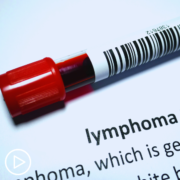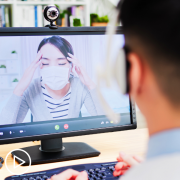Follicular Lymphoma Monitoring and Maintenance: An Expert Weighs In
Follicular Lymphoma Monitoring and Maintenance: An Expert Weighs In from Patient Empowerment Network on Vimeo.
What do follicular lymphoma patients need to know about monitoring and maintenance therapy? Expert Dr. Sameh Gaballa shares research about maintenance treatment, maintenance therapy risks versus benefits, and virtual visits for consults and second opinions.
Dr. Sameh Gaballa is a hematologist/oncologist specializing in treating lymphoid malignancies from Moffitt Cancer Center. Learn more about Dr. Gaballa.
See More from START HERE Follicular Lymphoma
Related Resources:

Follicular Lymphoma Disease Transformation and Secondary Cancer Risk |

|

|
Transcript:
Lisa Hatfield:
Can you speak to maintenance therapy and monitoring in follicular lymphoma? And what signs of infection should patients and care partners be aware of during treatment?
Dr. Sameh Gaballa:
Yeah, so there have been randomized studies in slow-growing lymphomas that show that if you do, after you get your standard treatment for follicular lymphoma, if you do what we call a maintenance treatment, usually with rituximab, which is an immune therapy, where you do it every two to three months for about two years, we have data showing that that decreases or delays the risk of relapse. However, it doesn’t change the overall survival, meaning that it just has patients in remission longer. When their disease comes back, they just get treated again at that point, and it doesn’t really affect survival.
So it’s one of those shared decision-making with the patients. I usually go over the risks and benefits of maintenance therapy. It’s optional. It’s not a must. During COVID, we pretty much stopped all maintenance treatments, because the risks were outweighing the benefits because maintenance treatment is…will suppress the immune system more, is associated with more infections. And these infections can be anything. I mean, it could be a pneumonia, could be recurrent urinary infections. It could be any type of infection. So there’s always this risk and benefit that we have to discuss with the patient.
Lisa Hatfield:
One thing that comes up, patients, I live in a state that we don’t have a lot of specialists for my type of cancer, for myeloma. If a patient wanted to consult with you, do you see patients via Zoom? Do you do consultations or maybe, I don’t want to call it a second opinion, but a consultation virtually for patients?
Dr. Sameh Gaballa:
So COVID has changed a lot of things. And that’s one of those things that have changed the way that we work, meaning offering virtual visits. And yes, sometimes we do, someone just wants to make sure they’re on the right track. They want us to review the records, review the diagnosis. We’ll get the biopsy slides reviewed here by our pathologist. And just to go over and make sure that they’re on the right track.
So yes, we routinely do those second opinions sometimes. Obviously in-person is usually better, because then we could do our own testing, and we could also examine the patients and see how they are. But yes, a virtual option is available. There are some restrictions sometimes. We cannot now see out-of-state patients as we used to, but during COVID that was not the case. But now we would have to see patients only in our state.










